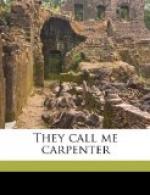I came to the city. Even outside the crowded district, the traffic was held up for a minute or two at every corner; so I found time to look about, and to realize that the Brigade had got to town. All day special trains had been pouring into the city, literally dozens of them by every road; and now the streets were thronged with men in uniform, marching arm in arm, shouting, chanting war-cries, roaming in search of adventure. Tomorrow was the first day of the convention, the day of the big parade: tonight was a night of riot. Everything in town was free to ex-service men—and to all others who could borrow or buy a uniform. The spirit of the occasion was set forth in a notice published on the editorial page of the “Times”:
“Hello, bo! Have a cigarette. Take another one. Take anything you see around the place.
“The town is yours. Take it into camp with you. Scruff it up to your heart’s content. Order it about. Let it carry grub to you. Have it shine your shoes. Hand it your coat and tell it to hold it until the show is over.
“We are all waiting your orders. Shove us back if we crowd. Push us off the street. Give us your grip and tell us where to deliver it. Any errands? Call us. If you want to go anywhere, don’t ask for directions. Just jump into the car and tell us where you’re bound for.
“Let’s have another one before we part. Put up your money; it’s no good here. This one’s on Western City.”
I saw that it was not going to be possible to drive through the jam, so I put my car in a parking place, and set out for the City Hall on foot. On the way I observed that the invitation of the “Times” had been accepted; the Brigade had taken possession of the town. It was just about possible to walk on the down-town streets; there were solid masses of noisy, pushing people, every other man in uniform. Evidently there had been a tagit agreement to repeal the Eighteenth amendment to the Constitution for the next three days; bootleggers had drawn up their trucks and automobiles along the curbs, and corn-whiskey, otherwise known as “white lightnin’,” was freely sold. You would meet a man with a bottle in his hand, and the effects of other bottles in his face, who would embrace you and offer you a drink; in the same block you would meet another man who would invite you to buy drinks for everybody in sight. The town had apparently agreed that no invitation should be declined. If the great Republic of Mobland had been unable to make for its returned war-heroes the new world which it had promised them—if it could not even give them back the jobs they had had before they left—surely the least it could do was to get them drunk!
And several times in each block you would have to get off the sidewalk for a group of ten or twenty flushed, dishevelled men, playing the great national game of craps. “Roll the bones!” they would shout, completely ignoring the throngs which surged about them. Each had his pile of bills and silver laid out on the pavement, and his bottle of “white lightnin’;” now and then one would take a swig, and now and then one would start singing:




